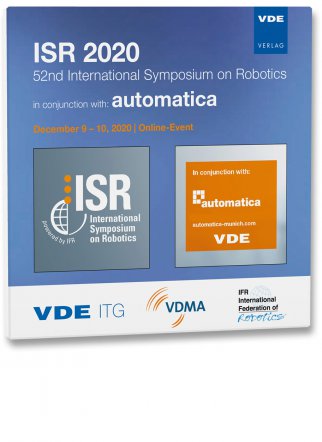Informationstechnische Gesellschaft im VDE (ITG) (Hrsg.)
ISR 2020
52th International Symposium on Robotics in conjunction with: automatica December 9 – 10, 2020, Online-Event
2020, X, 299 Seiten, 140 x 124 mm, Slimlinebox, CD-Rom
ISBN 978-3-8007-5428-1, E-Book: ISBN 978-3-8007-5429-8
Persönliche VDE-Mitglieder erhalten auf diesen Titel
10% Rabatt
In two conference tracks and a poster session over two days, the ISR 2020 will offer an insight into the latest state-of-the-art robot technologies to participants from both industry and research. Sessions will be held on relevant topics such as Modeling, Planning and Control, as well as Components and Technologies. Developments from the area of Robotics in Production and Industrial Robots will also be addressed, as well as Service and Mobile Robotics. Additionally, we are planning sessions on Robotics in New Markets & Applications, as well as Human-robot-collaboration / Future of Work. And additional Business Track will offer guest speakers from the industry the opportunity to present their current products and developments. The special session for the IERA Award finalists will round off the conference program.
This international conference is jointly organized by the Mechanical Engineering Industry Association (VDMA) and the Information Technology Society (ITG) within VDE. The ISR 2020 was originally organized as customary parallel to the automatica, the leading exhibition for smart automation and robotics. Due to the ongoing situation with COVID-19, the trade show has been cancelled in 2020. Messe München is now working with exhibitors to develop a new in-person event with digital elements, adapted to the circumstances in times of the coronavirus. The new event has been conceived as a compact 'exhibition before the exhibition' for early summer 2021 and is to become an add-on to automatica. Detailed information on this will follow shortly.
Die ITG ist als interdisziplinär arbeitende, wissenschaftliche Fachgesellschaft in das fachübergreifende Netzwerk des VDE eingebunden. Sie agiert als Schnittstelle für Experten der Informationstechnik (ITK) in Wirtschaft, Verwaltung, Lehre und Forschung. Ihre Mitglieder bündeln in enger internationaler Anbindung die deutsche Kompetenz im Bereich der ITK. Die ITG fördert Forschung und Anwendung dieser Schlüsseltechnologie sowie deren effizienten Einsatz in den Bereichen Daten- und Kommunikationstechnik und -systeme, Umweltschutz, Medizin und Verkehr.


